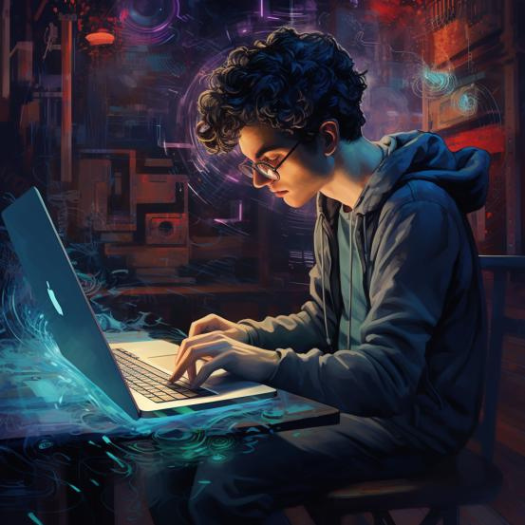2 min read
AI Bard or Plagiarism Cheat? The Complexities of AI in Education
Rebecca Barron : Jan 8, 2024 10:30:00 AM

Remember that childhood dream of a magic writing machine effortlessly spewing out stories on command? Well, it’s here now in the form of ChatGPT and its kin. With these AI tools generating essays and articles at light speed, a complex question arises: Does using AI for schoolwork constitute plagiarism?
The answer is far from straightforward. Let's examine some perspectives.
The Case Against AI: Red Flags Hoisted High
For many, AI-assisted work instantly raises the specter of cheating. After all, students submit content created predominantly by a machine, not their own mental effort. Additional arguments:
- AI mimics and recombines existing ideas, lacking true originality.
- Using Chatgpt to write essays, students might be tempted to pass off AI words as their own without attribution, blatantly plagiarizing.
- Unchecked AI use disadvantages rule-abiding students, creating an uneven playing field.
- Overreliance on AI erodes crucial academic skills like research, analysis, and independent writing.
- AI risks becoming a crutch, leading to the atrophy of students' own writing abilities.
- Schools need clear, consistent policies to prevent confusion and inequity around AI use.
The Pro-AI Counterpoint: Responsible Usage as Learning Aid
However, let's not jump to conclusions just yet. The world of AI is far more intricate than it seems. With careful application, AI has the potential to enhance student learning greatly. Consider:
- AI can spark new ideas and perspectives, serving as a creativity and brainstorming aid.
- With editing and refinement, students can shape AI output to reflect their own voice and analysis.
- Proper paraphrasing and citation allow students to credit AI while articulating concepts in their own words.
- Like other permissible learning aids, AI can enhance students' knowledge if used responsibly.
- For students with special needs, AI can provide invaluable writing support.
- Rather than strict rules, the focus should be on furthering learning aims through responsible AI integration.
Charting a Path Forward: Policy Principles to Ponder
How, then, should educators navigate this AI-powered terrain? Policymaking should consider these key principles:
- Prioritize pedagogy over-policing; evaluate if AI use enhances or impedes learning aims.
- Provide clear, acceptable usage guidelines without ambiguity.
- Mandate transparency via disclosures on how and when students use AI.
- Apply AI plagiarism detectors cautiously, given their limitations.
- Ensure accessibility for students who benefit from AI support.
- Maintain flexibility to adapt policies as technology and norms evolve.
- Expand sections like accessibility based on focus and audience.
Preparing for an AI-Fueled Future
Beyond writing assistance, AI is transforming job landscapes across sectors. Understanding its capabilities and limitations is becoming a crucial future-ready skill for all students.
Educators play a key role in preparing students for an AI-powered world by:
- Providing hands-on AI experience through carefully monitored tools like ChatGPT. Direct engagement will demystify AI's workings and limitations for students.
- Fostering critical thinking on ethical AI use cases. Thoughtful discussion can help students learn to apply AI judiciously to augment human skills rather than replace them.
- Exploring both utopian visions and cautions around AI through speculative writing prompts and activities.
- Discussing the impact of AI on careers and society. This develops an understanding of how AI may shape industry needs and occupational skills in the future.
- Teaching data and digital literacy as foundational competencies in an AI context.
- Balancing AI competencies with human skills like creativity, critical thinking, and emotional intelligence, which exceed AI's capabilities.
- Maintaining flexible curricula and policies that embrace AI's role in technological change rather than rigidly resisting it.
With insight and preparation, we can develop students' understanding of AI as a powerful tool to aid human endeavors, not a replacement for them. This provides the strong ethical foundation they need to harness AI applications in their future college, career, and civic paths.
Finding The Human-AI Balance
The integration of AI into education raises critical questions for policymakers and educators. As AI capabilities rapidly advance, we need wisdom and nuance to develop policies and curricula that allow AI to enhance, not undermine, student learning.
The path forward requires flexible, collaborative policies focused on pedagogy over prescriptiveness. With care and insight, we can establish ethical AI guidelines that support human skills like creativity and critical thinking. Although risks exist, the possibilities are immense for AI and humans to complement each other in service of deeper learning. By embracing thoughtful innovation, we can craft an educational future where AI illuminates new horizons for human potential.
Earn Continuing Education Units with Alludo & Fresno Pacific University
Earn Continuing Education Units from Fresno Pacific University!



